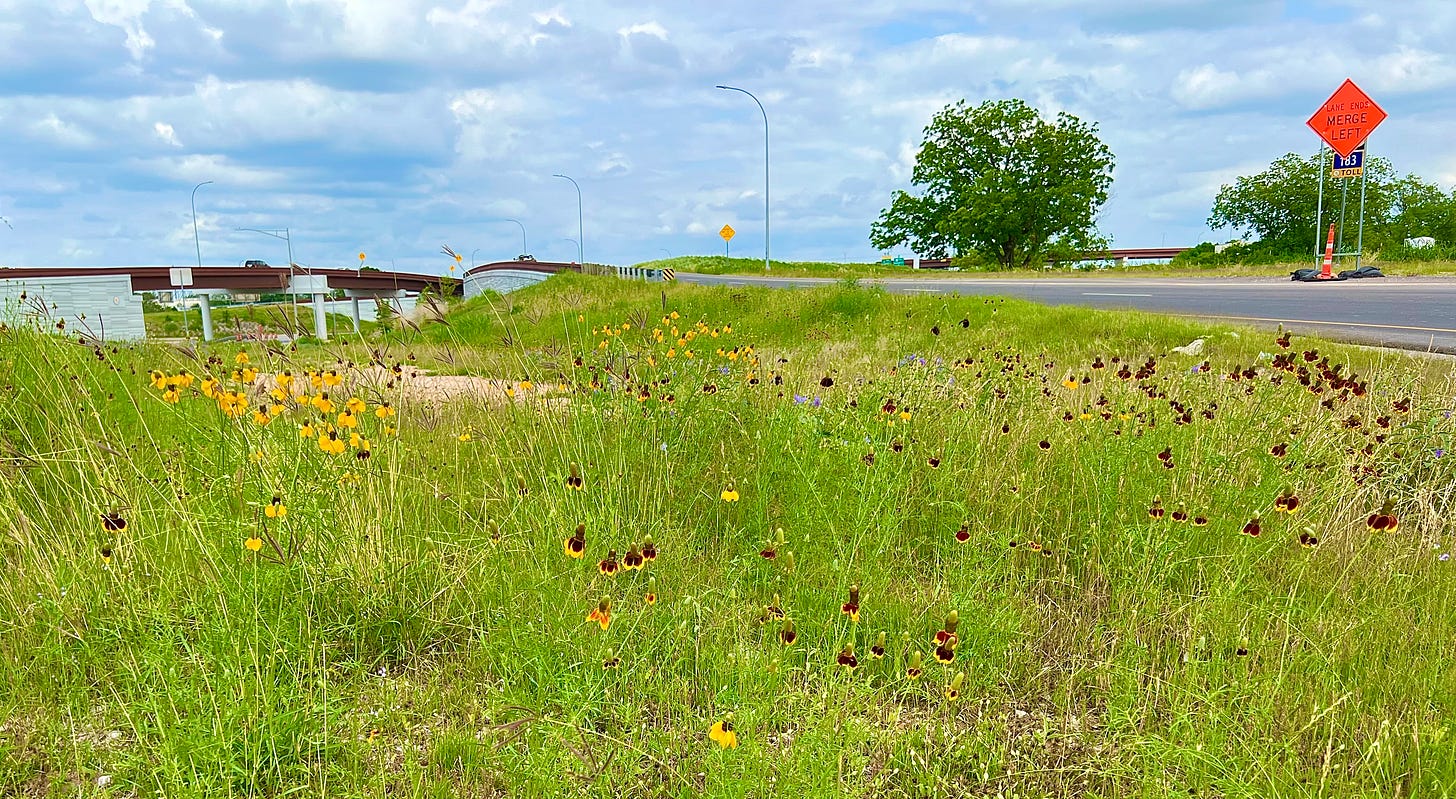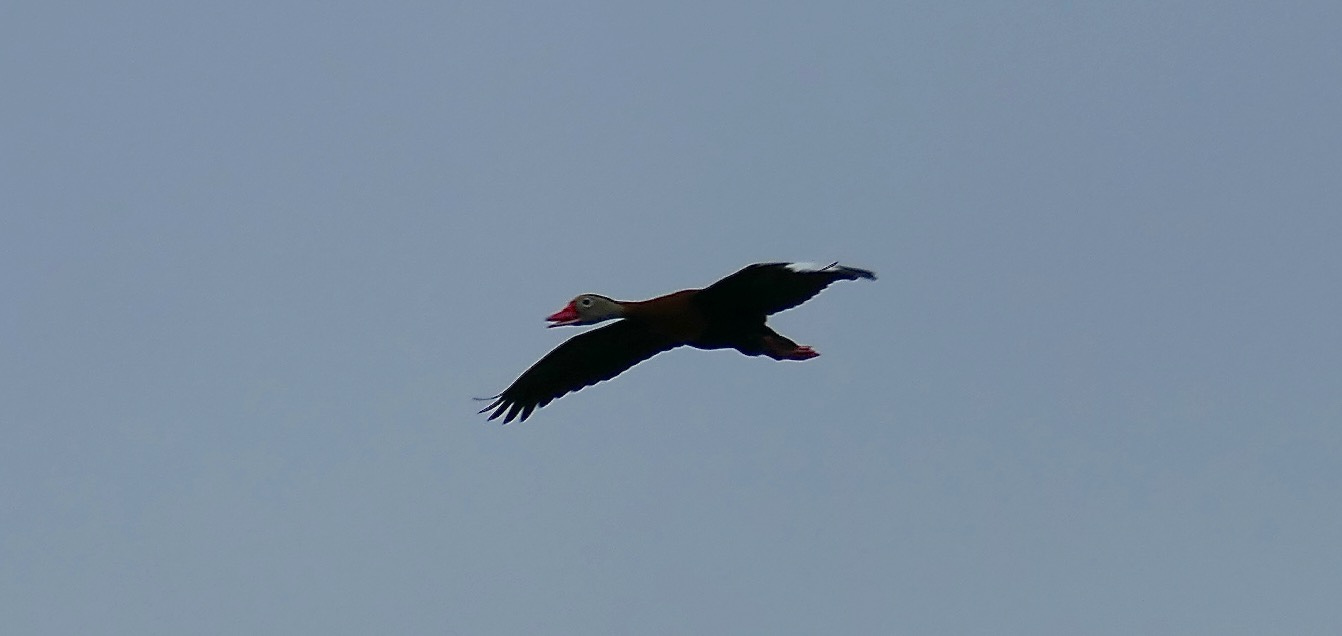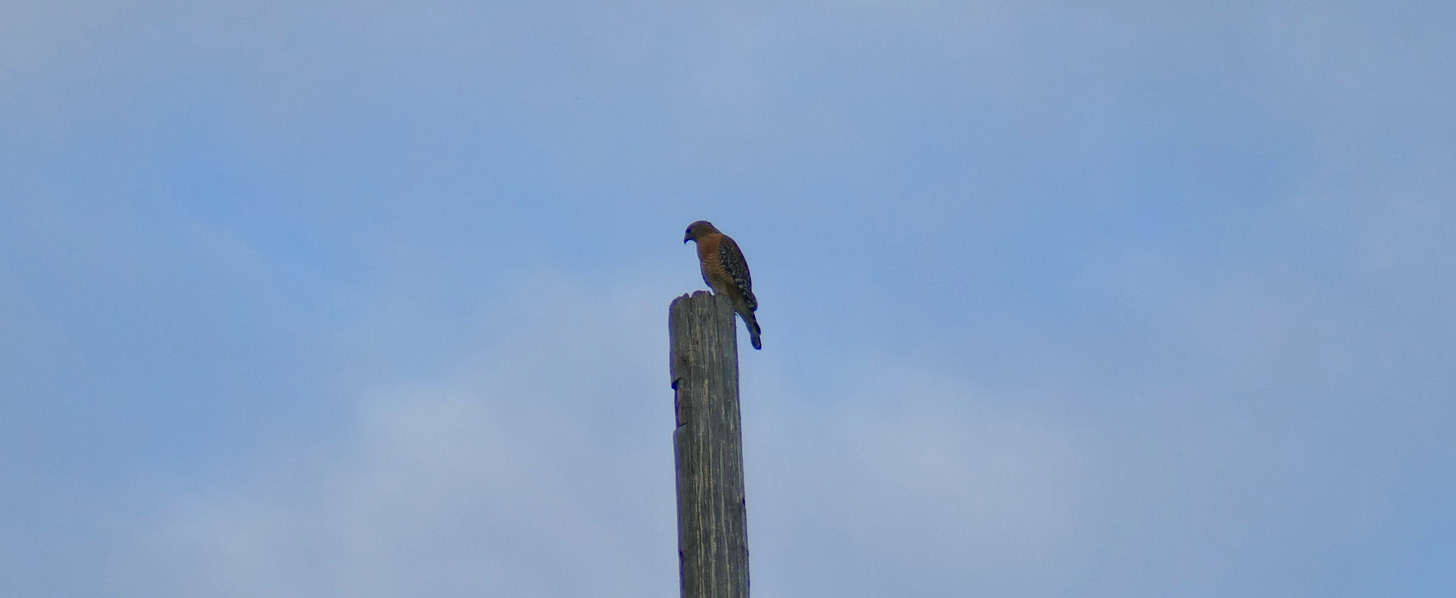Maypoles and telephone poles
Thursday morning the edgeland cur and I spotted this tree duck on a telephone pole across from the abandoned AT&T maintenance yard. You can always hear those birds before you see them, and then when you see them, they always seem bigger than you remember, bigger and gawkier, the kind of ducks that really get their goose on, which is maybe why they seem to adapt so well to cities.
If you look them up on the Cornell Ornithology Lab’s site, they’d have you believe that orange-billed whistling ducks rarely come further north than the Rio Grande to breed, as a species most of whose members stay year-round in the more equatorial climes of the Americas, but I’ve seen them every year since 2009. The Audubon guide suggests that warmer temperatures are what have them up here. That, together with their well-documented capacity for occupying the environments we have damaged, makes me think their persistent appearance deep in the heart of Texas is a portent of their plan to live in the ruins we will eventually leave behind.
We got a good long rain Monday, and by the end of the week the wildflowers finally exploded in a way they hadn’t managed to all through the spring. Mostly in the places they aren’t supposed to grow, like the recently scraped zone at the base of the tollway onramp. If I were more enterprising I would figure out how to garland one of those telephone poles into a May pole, even though May Day is a holiday that doesn’t show up on the American calendar, not even on our new calendar apps that seem to include every other holiday of this diverse world. Tag der Arbeit is what it said on the German pocket calendar that got stolen from my car Thursday evening, but over here our fear of pagans and commies runs deep, all the way back to Mount Dagon.
Friday night, the frogs were singing loud in a way I hadn’t heard in ages. After we got baby to bed I was reading an old paperback of E. J. Holmroyd’s Alchemy when I heard tapping at the patio door, and found the prodigal toad there knocking by throwing his whole body at the glass, as if he wanted to come in and listen to records instead.
The retama bloomed this week too, barbed branches blasting yellow through the lattices of barbed wire and chain link. The signs of life along the roadways and fencerows motivated us to find our way down into the woods behind the factories. I let Lupe lead at first, and she followed the road to nowhere, along the old right of way. I wondered if she has developed a nose for how to roam without trespassing, but then realized she must have been following the scent of other animals, and that the path of the old ferry access probably is one of those ancient deer trails turned Indian trail turned county road.
You know you are in the right place when you stumble upon one of those spots that seem completely impassable to bipeds, where the vegetation has grown so thick and so strange in some land use chokepoint that you are sure you would not even be able to bushwhack your way through, until you do.
On the other side of that portal, we found a field of green, foliage so thick it almost hid the dairy plant from view, and looked like it was working to pull one of those telephone poles down. The vegetation created rolling crests and holes all through the field, which in winter you can see was terraced not that many years ago to make room for a warehouse or factory that was never built. Putting the park back in industrial park, even if it was mostly invasive plants.
When we crossed it, and stepped down into the wooded floodplain below, the foliage was even thicker, and mostly native. A sea of inland sea oats, so lush the blades cut above my waist and the dog disappeared like the diver she is.
That’s when I decided to help find our way to a trail that would make it a little easier on her old bones, and then down to the river, which was at its most shallow, so we could walk in it instead of trying to find our way through the impassable banks, whose plants had been charged by dam releases as well as rain.
When you walk along the river’s edge in spring or early summer, your every step flushes out a flurry of dragonflies from the switch grass, many of them the color of red wine. So many and with such luminescent energy that you might think of fairies, especially if you live as I do with a toddler who has discovered there is an entire oeuvre of movies about the secret life of Tinkerbell. They are almost impossible to photograph, unless you can catch them at rest.
We expected to see more birds, but we were happy to just see bugs and plants and plovers instead of people. Often around now the tree ducks come down to the river in the morning to feed, and you’ll see them standing there in the shallows on their long funny legs while the mallards and wood ducks paddle around nearby. Saturday we had given up until we finally heard one coming our way, and deduced that they must have been gathered further upriver.
On the opposite side of the river, there’s a park that once was a trailer park, rumored to have thrived as an intentional community some time around the beginning of the Ford Administration. Its remnants have slowly been sliding their way to the sea since then, as the bluff erodes with the river’s ever more aggressive cuts trying to push to the south. The bluff face is always freshly exposed dirt, with dangling conduit and fractured slabs, leaving room for the nests the kingfishers carve like little caves in the clay.
There are telephone poles up there too, many of them right on the edge, and some of them finally unhung of the cables they once carried. The raptors love them the way they love dead trees, for the vantage they afford, especially up there where you can see every fish in the water almost all the way to the bridge. We spotted one little red-shouldered hawk at the middlemost of those poles, largely oblivious to our presence, focused on the field below its perch rather than the scales flashing in the water.
It’s easy to forget how every telephone pole was once a tree, especially in a landscape where telephone poles are so ubiquitous you learn not to see them at all, except in those moments when you open your eyes and they are all you see. When you see them as ruins, after they lose their utility, you can see how much they really are like Maypoles. Maybe when they are all ruins, people will again learn to worship the flowers that grow up their side, instead of the anthropocentric fathers we see in the mirrors of our minds.
Further reading and watching
For more on the curious history of May Day in America, check out my installment on the subject from this time last year, “May Day in the American edgelands.”
“Deer trail becomes Indian trail becomes county road” is a recurring line in the 2011 film General Orders No. 9 by Robert Persons. I watched the film when it came out, a beautiful, weird, enigmatic look at the overwriting of the American landscape by city and capital, and it has stuck with me ever since, even as the auteur’s exact intentions are unclear and I have a Yankee’s apprehension about any film whose title is a reference to Robert E. Lee giving up the fight. You might call it a redneck Koyaanisqatsi. Here’s the trailer, if you’re curious.
Friday’s mail brought my pre-ordered copy of Julie Phillips’ new book The Baby on the Fire Escape, a consideration of maternity and creativity through the lives of six women writers and artists: Alice Neel, Doris Lessing, Ursula Le Guin, Audre Lorde, Alice Walker and Angela Carter. I loved Julie’s biography of the science fiction writer Alice Sheldon aka James Tiptree, Jr., and her more recent pieces on Ursula K. LeGuin for The New Yorker and elsewhere, and the newest had me hooked even from the first random sampling I took as I opened it up. Julie and I went to high school together, but did not meet (that either of us can recall) until we were both panelists at the same science fiction convention. My own parental duties prevent me from hanging out with Julie in person at our reunion next weekend, but I am very much looking forward to this book, out this week from Norton.
Lastly, thanks to biologist Mike Westphal for the below moniker for the work I have been doing in this newsletter. I’m pretty sure I borrowed “Landscape Romanticism” from someone else, but I’ll happily take “Landscape Noir.”
Field Notes will be off next Sunday. Happy May Day, and have a wonderful week.















I look forward to reading your weekly piece. Please keep them coming.
Well done. Thanks.
Those are damselflies, which can fold their wings at rest, unlike dragonflies...